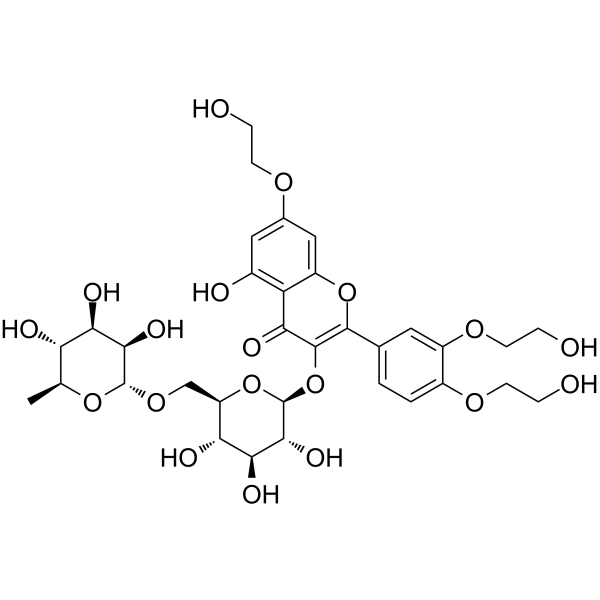天然产物 糖类和糖苷 Saccharides and Glycosides
Troxerutin;(Synonyms: 维脑路通; Trihydroxyethylrutin) 纯度: ge;98.0%
Troxerutin 也被称为维生素 P4,是天然生物类黄酮芦丁的三羟乙基化衍生物,其可抑制活性氧 (ROS) 的产生并抑制 ER 应激介导的 NOD 活化。

Troxerutin Chemical Structure
CAS No. : 7085-55-4
| 规格 | 价格 | 是否有货 | 数量 |
|---|---|---|---|
| Free Sample (0.1-0.5 mg) | ; | Apply now | ; |
| 10;mM;*;1 mL in DMSO | ¥660 | In-stock | |
| 100 mg | ¥600 | In-stock | |
| 5 g | ¥990 | In-stock | |
| 10 g | ; | 询价 | ; |
| 50 g | ; | 询价 | ; |
* Please select Quantity before adding items.
Troxerutin 相关产品
bull;相关化合物库:
- Natural Product Library Plus
- Drug Repurposing Compound Library Plus
- FDA-Approved Drug Library Plus
- FDA-Approved Drug Library Mini
- Bioactive Compound Library Plus
- Immunology/Inflammation Compound Library
- NF-kappa;B Signaling Compound Library
- Natural Product Library
- FDA-Approved Drug Library
- Anti-Cancer Compound Library
- Drug Repurposing Compound Library
- Antioxidants Compound Library
- Diabetes Related Compound Library
- Glycoside Compound Library
- Oxygen Sensing Compound Library
- Anti-COVID-19 Compound Library
- NMPA-Approved Drug Library
- Endoplasmic Reticulum Stress Compound Library
- Phenols Library
- Pyroptosis Compound Library
- FDA Approved amp; Pharmacopeial Drug Library
- Flavonoids Library
- Food-Sourced Compound Library
- Targeted Diversity Library
| 生物活性 |
Troxerutin, also known as vitamin P4, is a tri-hydroxyethylated derivative of natural bioflavonoid rutins which can inhibit the production of reactive oxygen species (ROS) and depress ER stress-mediated NOD activation. |
IC50 Target |
ROS[1], NOD[2] |
||||||||||||||
|---|---|---|---|---|---|---|---|---|---|---|---|---|---|---|---|---|---|
| 体外研究 (In Vitro) |
The results reveal that the maximum protective effect against ROS induced cell damage in the HDP cells occurs following pretreatment with 10 μM Troxerutin. Treatment with H2O2 alone decreases cell viability to 77.33±2.44%; however, pretreatment with 10 μM Troxerutin maintains cell viability at 90.88±2.24% following H2O2 exposure (P<0.05). At concentrations of 5 and 10 μM, pretreatment with Troxerutin causes a decrease in the number of cells in the sub G1 phase, indicative of cell death. In the control and Troxerutin-only-treated cells, 3.58±0.15 and 0.89±0.11% are 2′7′-dichlorofluorescein (DCF)-positive (P<0.05), whereas treatment with H2O2 alone increases the level of ROS to 46.36±2.33%. The cells pretreated with Troxerutin are 19.92±1.95% DCF-positive following H2O2 treatment, indicating that Troxerutin reduces the H2O2-induced production of ROS in the HDP cells[1] . MCE has not independently confirmed the accuracy of these methods. They are for reference only. |
||||||||||||||||
| 体内研究 (In Vivo) |
Troxerutin effectively lowers body weight and obesity-related metabolic parameters in high-fat diet (HFD)-treated mice. Oral administration of Troxerutin notably inhibits those liver injuries in HFD-treated mice, restores glucose intolerance and insulin signaling, and diminishes hepatic gluconeogenesis in HFD-treated mice. Troxerutin remarkably inhibits the nuclear translocation of NF-κB p65, as well as the expressions of its target genes, in the livers of HFD-treated mice. Troxerutin also depresses endoplasmic reticulum (ER) stress-mediated Nucleotide oligomerization domain (NOD) activation in HFD-treated mouse livers[2]. Lipid depositions in tunica intimae and tunica media are attenuated in Troxerutin-treated diabetic rats compare with untreated diabetic rats. Structural disarrangement and deformity of smooth muscle cells in aortic tissue of Troxerutin-treated diabetic rats are considerably lower than histology of untreated diabetic aorta. Administration of Troxerutin for four weeks to diabetic rats significantly reduces the level of malondialdehyde (MDA) compare to that of untreated diabetic rats (P<0.01)[3]. MCE has not independently confirmed the accuracy of these methods. They are for reference only. |
||||||||||||||||
| 分子量 |
742.68 |
||||||||||||||||
| Formula |
C33H42O19 |
||||||||||||||||
| CAS 号 |
7085-55-4 |
||||||||||||||||
| 中文名称 |
维生素P4;维脑路通;三氧乙基芦丁;曲可芦丁;托克芦丁;曲克芦丁 |
||||||||||||||||
| 运输条件 |
Room temperature in continental US; may vary elsewhere. |
||||||||||||||||
| 储存方式 |
|
||||||||||||||||
| 溶解性数据 |
In Vitro:;
DMSO : 100 mg/mL (134.65 mM; Need ultrasonic and warming) 配制储备液
*
请根据产品在不同溶剂中的溶解度选择合适的溶剂配制储备液;一旦配成溶液,请分装保存,避免反复冻融造成的产品失效。 In Vivo:
请根据您的实验动物和给药方式选择适当的溶解方案。以下溶解方案都请先按照 In Vitro 方式配制澄清的储备液,再依次添加助溶剂: ——为保证实验结果的可靠性,澄清的储备液可以根据储存条件,适当保存;体内实验的工作液,建议您现用现配,当天使用; 以下溶剂前显示的百
|
||||||||||||||||
| 参考文献 |
|
| Cell Assay [1] |
The cells are plated at a density of 4×103/well in a 96-well plate. At 70 to 80% confluence, the cells are treated with Troxerutin at concentrations ranging between 0 and 60 μM for 24 h at 37°C. Subsequently, 10 μL water soluble tetrazolium salt assay solution is added to each well and, following incubation for 30 min at 37°C, the optical density is measured at 490 nm using a reader. To examine Troxerutin mediated ROS protection, the cells are pretreated with Troxerutin at the following concentrations: 0, 5, 10 and 15 μM for 8 h. Subsequently, 750 μM H2O2 is added to each well. Following incubation for 24 h at 37°C, cell viability is evaluated using an Cell Viability Assay kit. The level of cell viability (%) is normalized to that of 0.1% dimethyl-sulfoxide (DMSO)-treated cells. Each experiment is repeated at least three times[1]. MCE has not independently confirmed the accuracy of these methods. They are for reference only. |
|---|---|
| Animal Administration [3] |
Thirty two adult male Wistar rats weighing 250 to 300 grams are used in this study. The animals are randomly divided into four groups (n=8/each) as: group I: control (C), group II: control with Troxerutin (C+TXR), group III: diabetic (D), and group IV: diabetic with Troxerutin (D+TXR). The control rats are received the same amount of citrate buffer alone. Development of diabetes is confirmed by measuring blood glucose levels, 72 hours later. Animals with blood glucose levels higher than 16.65 mM (300 mg/dL) are considered diabetic and those with blood glucose levels lower than this value are excluded from the experiment. Troxerutin (150 mg/kg/day) is administered orally, once daily for four weeks. After 10 weeks of induction of diabetes, diabetic animals as well as the time-matched controls are killed and aortic samples are collected[3]. MCE has not independently confirmed the accuracy of these methods. They are for reference only. |
| 参考文献 |
|
